lundi, 18 avril 2016
Communication contre politique Discours publicitaire et déni du réel

Communication contre politique
Passons rapidement sur l'échec de la "Belle alliance populaire", réunion de bistrot (ce n'est pas une injure : cela se passait au Paname Café) sensée rajeunir une version branchée de la gauche plurielle. Sur les trois points ("beauté", unité et popularité), les uns ont ironisé sur le caractère "populaire", d'un rassemblement qui réunit des ministres, des membres de la bourgeoisie d'État, des dirigeants d'association subventionnées, des représentants "de la société civile" très cathodiques, mais guère de prolétaires. Les autres ont fait remarquer que la dimension unitaire d'un rassemblement de gens qui sont déjà rassemblés par des intérêts communs et coopèrent au quotidien est un peu redondante : ils n'ont guère besoin "d'élaborer une alternative au libéralisme ambiant et au nationalisme montant", ou de démarches innovantes et de "coconstruction politique", pour continuer à se redire ce qu'ils se disent depuis quelques années. Pour notre part, c'est la dimension "esthétique" de la chose qui nous le plus surpris, sauf à trouver un sens symbolique pop au logo du mouvement visiblement inspiré de la marque Celio.
Le second échec de la semaine est celui du président dont l'émission ne réussit ni à rassembler un taux d'audience décent, ni à faire la première page des journaux, ni surtout à changer l'opinion de qui que ce soit. Il est vrai que l'exercice qui consistait- en récitant chaque fois sa fiche chiffrée par son cabinet et en réaffirmant que le mal n'est que dans nos esprits (la France a d'énormes atouts, la situation commence à s'améliorer) - à rassurer des gens qui vivent des drames ou des angoisses tout à fait réels a ses limites. L'empathie est surjouée - on comprend la patronne, la mère de jihadiste, l'électeur FN, le jeune qui va retourner à la Bastille peut-être pour scander "tout le monde déteste le PS", on est du côté de tout le monde et face à nulle part- et surtout dialoguer ne consiste pas à assurer aux gens que l'on compatit et qu'avec un peu de pédagogie, ils vont se sentir mieux. Le style très technocratique de la démonstration faisait penser aux pires prestations de Giscard d'Estaing initiant des citoyens aux "réalités" du monde et de l'économie, c'est-à-dire à des nécessités. À trop refuser le principe d'autorité (ce qui encourageait ses interlocuteurs à le traiter de manière quasi agressive), à vouloir être trop "proche des gens", toujours dans la compassion, et surtout à ne rien dire que "nous allons faire plus du même", chiffres à l'appui, le président échouait dans une mission qui était peut-être impossible.
Troisième faute, reconnue hautement, celle d'Emmanuel Macron. L'homme qui fait se pâmer les rédactions avec des idées comme "ni droite, ni gauche, en marche", ou "ayons des idées nouvelles, accueillons tous les talents et dépassons tous les clivages" avait commencé par produire un clip qui n'était pas sans évoquer les publicités des banques ou de Coca Cola des année 80 (il empruntait pas mal de plans à des banques d'images américaines). Mais sa "bêtise" reconnue consistait surtout à se faire encenser par Paris Match dans un style qui, lui, évoque le marketing politique à la Kennedy : couple idéal en dépit de la différence d'âge, introduction dans l'intimité familiale, sourire perpétuel, autocongratulation, sans oublier les indispensables allusion à la modernité et au dynamisme de gens en accord avec leur époque. Rebelotte lorsque le jeune surdoué plein de galanterie révèle qu'il s'agit d'une "bêtise" de sa femme pas très habituée au système médiatique et que l'on ne recourra plus jamais à cette stratégie (ah bon, c'était une stratégie).
Dans tout ce qui précède, il y a des maladresses personnelles (ou celles des spin doctors surpayés qui ont concocté tout cela) et il y a, ce n'est pas très original de la dire, la traduction d'un incroyable fossé entre la vision du monde des élites et celle du peuple. Mais, au-delà des petits gags sur lesquels il est facile d'ironiser, un symptôme plus grave : ces gens sont entrés en post-politique. Ils vivent mentalement dans un monde régi par l'économie en dernière instance, un monde parachevé où il suffit d'un peu plus de gouvernance d'Europe et de PNB pour que les choses s'arrangent, un monde où il n'y a pas d'intérêts divergents ni d'ennemis mais des problèmes à résoudre tantôt par une gestion plus "moderne" et une meilleure allocation des ressources, tantôt par un peu de pédagogie (chasser les peurs, comprendre ses atouts, éclairer les "gens" tentés par le populisme ou le découragement...). C'est peut-être ce monde-là auquel ne croient plus que ceux qui en agitent le fantôme.
00:05 Publié dans Définitions, Théorie politique | Lien permanent | Commentaires (0) | Tags : communication, définition, théorie politique, politologie, sciences politiques |  |
|  del.icio.us |
del.icio.us |  |
|  Digg |
Digg | ![]() Facebook
Facebook
Power Hovers over Asia Once Again
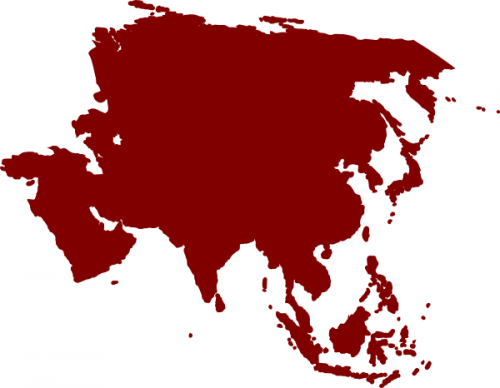
Power Hovers over Asia Once Again
When Portugal and Castile set out to sail the Atlantic to skirt the Islamic fence, the main political and economic forces of the world were not European. The most important power of the era, as much for its territory (10 millions square kilometers) as for its population (around one-hundred million inhabitants), as well as for its development in manufacturing and craftsman production, was the Chinese Empire.
The Ming Dynasty in 1368, with the expulsion of the Mongols, was able to achieve political unification and the centralization of power. China was the main military force in the world. Its war marina was made up of one-thousand five-hundred ships, and its army added up to a little over one million men. It also bragged the technological vanguard of the era. From this technological development came incredible important inventions, like that compass, gunpowder, paper, the printing press, just to mention the most relevant and well-known ones. Likewise, in matters of infrastructure –roads and canals- China was possibly the most developed region in the world. It also underwent intense commercial traffic – of very considerable dimensions - with the Indonesia, Philippines and Japan of the time.
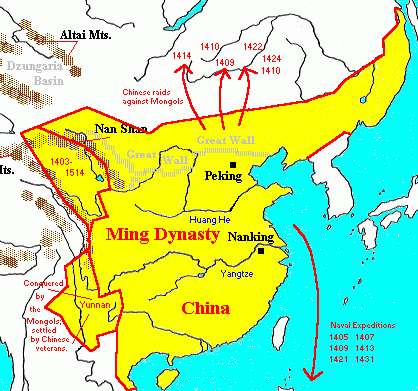
Asia held in its bosom – together with China - other important political and economic powers: the Moghul Empire, the Maratha Confederacy – in what is now the territory of India -, the Persian Empire and the Ottoman Empire. India, though it covered a surface area of 3.5 million square kilometers, had a population of eighty million inhabitants and with an industrial development not inferior to China, it found itself disincorporated between the Moghul Empire, the Maratha Confederacy and a hodgepodge group of independent princedoms. The Maratha Confederacy dominated the center of modern-day India. To the south, a multitude of independent princes controlled the Malabar and the Coromandel coasts. Political disintegration made India, despite its enormous economic weight, not is a geostrategic player of any importance.
Persia was the second Islamic power, with close to ten million inhabitants. In 1502, under the Safavid Dynasty – of Shiite creed -, it recorded an extremely important rebirth as much of its political power as in trade, industry, art and architecture. Its strategic position caused it to become a power with possibilities of influencing world events. The Turkish Ottoman Empire – then, the main strategic “threat” of the European Peninsula- was the major Islamic power. With fourteen million inhabitants, it dominated the Balkan Islands, the Black Sea, the eastern Mediterranean, Asia Minor, the Mesopotamian, Northern Africa and the Red Sea. [1]
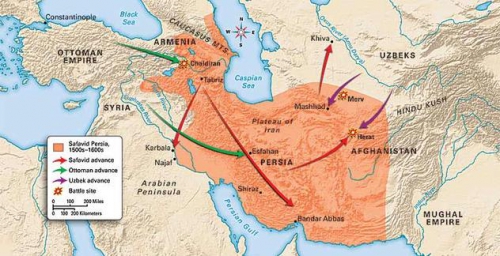
The center of world power was, unarguably, in Asia, Nevertheless, with the ocean voyages of discovery that western European sailors carried out five centuries ago, the transformation of the geopolitical map of the world began. Thus the center of world power gave a sudden leap. It jumped, from the heart of the Chinese Empire, to the Iberian Peninsula and later to flutter over Seville and Lisbon, and then for a time over to Isabel’s England to finally skip over the Atlantic and plant itself in North America, where the elite leadership, descendants of the “founding fathers”, built the first continental industrial State-nation in history, raising, as had England in its time, once again, the threshold of power.
From the beginning of the first period of globalization – starring the great Portuguese, Italian and Spanish sailors -, power abandoned Asia.
Nowadays, however, as Arnold Toynbee warned early on:
We are going into a new age, in which the physical means of human traffic will no longer be the steppe nor the ocean but rather the air, and in an aerial age humanity can reach, by flapping its wings, the liberation of its juvenile bonds to the capricious configuration of the surface –solid and liquid- of the globe. In an aerial age, the central position of gravity of human affairs can be determined by human geography and not the physical one; not by the disposition of the oceans and sea, steppes and deserts, rivers and mountain ranges, passes and narrow passages, but rather by the distribution of mass, energy, ability, knowledge and human character. And, amongst these human factors, the gravitation of mass may eventually become great than its influence in the past. (Toynbee, 1967: 73)
Thus, it is possible to state that power hovers, once again, over Asia though it still has not “alighted” on any specific nation.
China, a New Actor that Aspires to Stardom
The intervention of the United States in the Second World War –though done belatedly so that the setback would allow the definite strategic weakening of the British Empire- was decisive to defeat the attempt of the most anti-human and sinister world domination of modern times. Humanity owes the United States – and Russia - for the defeat of the Nazi barbarity.
Nevertheless, the victory of the United States over the powers of the Axis did not lead it, in and of itself, to become the only hegemonic world power, as the American ruling elite had planned, and believed, as far back as the times of war against Spain.[2]
And it is true that, for forty years, the “soviet counter power” hindered the hegemonic configuration but, from the implosion of the Soviet Union on, the United States recuperated “global primacy” and it was once again left open to North American power the possibility of unilaterally organizing the international system in its different aspects, in such a way that its own interests, in any order, would be assured and would be maintained in time. However, this possibility today depends on – according to Brzezinski’s perspective - not only on the power that the United States has accumulated but also on how it “plays” on the Euro-Asian game board.
According to Brzezinski, since Eurasia is and has been the center of world power –since the time the continents have been able to interact in the terrain of politics, for around five-hundred years, to hinder the emergence of a Eurasian power, dominant and antagonistic, for the United States it is a “fundamental objective” in terms of its capacity to exercise global primacy: “The foreign policy of the United States should continue to dealing with the geopolitical dimension and employ its influence in Eurasia to create a stable continental balance in which the United States would exercise the function of political referee. Eurasia is, well, the game board in which the struggle for global primacy continues being played, and that struggle involves geo-strategy: strategic arrangement of political interests” (Brezinski, 1998: 12). Because of that, he concludes, “it is essential that there not be an emergence of any aspirant to Eurasian power capable of dominating Eurasia and, furthermore, also capable of challenging the United States” (12).
In the analysis made by the majority of the American ruling elite, that “aspirant State” and which, according to Brzezinski’s logic, would have to be neutralized before it finished completely developing its national power- is the People’s Republic of China. In Brzezinski’s thesis, the global primacy of the United States “depends directly on how long, and how effectively, they can maintain their preponderance in the Eurasian continent” (Brzezninski, 1998: 39).
Nationalism & Globalization in China
The extraordinary consistent growth of Chinese domestic gross product, the opening of its economy to foreign investments, the spectacular modernization of its productive apparatus and the impacting outbreak of its industrial production into the world markets clouds the fact that China dives into globalization in outright nationalistic effervescence. This is the politically central fact that should be kept in mind for any serious analysis of the future of this country. Chinese leadership has a historical imperial vocation and has lived through the last five-hundred years of Western predominance as a “deep humiliation”. [3]
In order to comprehend Chinese nationalism and the “feeling of humiliation” –that feeds it to a large extent- it is not enough to retract to the Opium War but rather it is better to remember that five-hundred years ago, when continents began to interact, the Chinese Empire – despite possessing all the required material conditions - was not the main player of the first stage of globalization due solely to an irreversible strategic error made by the Ming dynasty.
As we have already affirmed, globalization starts when the Latino-Germanic world, venturing out into the immense Atlantic Ocean, overcomes the enclosure to which it had been submitted by the Islamic-Ottoman world in the so called “Middle Ages”, from the 7th century on. Until that historic moment, all the small Christian kingdoms of the European peninsula were much farther behind the Chinese Empire and they possessed, before it, an outright scientific and cultural deficit:
The European culture, less developed (in comparison with the Islamic, Hindustani, and especially the Chinese culture), separated by the Ottoman-Islamic “wall” of the central regions of the Asian-AfroMediterranean continent was, then, until the end of the 15th century, peripheral. (Dussel, 2004: 19)
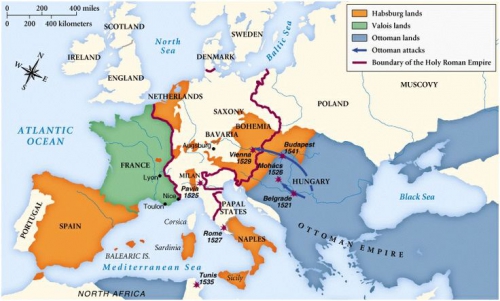
Seventy years before Columbus landed on America, the Chinese Imperial fleet had already carried out numerous trans-oceanic trips with one of the possibly reaching as far as the American continent. Admiral Zheng He, a Muslim Eunuch, installed a large school of oceanic navigation and built the biggest naval squadron in history for the Chinese Emperor.
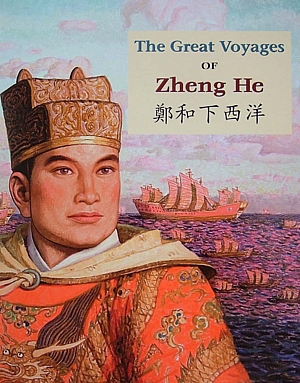 Zheng made, at least, seven incredible voyages, between 1405 and 1423, around the southern Pacific, the Indian Ocean, the Persian Gulf and the coasts of Africa. With his expeditions he opened the doors of the empire to other cultural realities and also to other commercial possibilities. On March 5th of 1421 he set sail from the Nanking port to make his seventh trip with a fleet composed of six-hundred junks and thirty-thousand crew members. These expeditions were commercial and scientific, and the squads mapped Africa and Asia, being it highly probable that they circumnavigated, for the first time, the entire globe and, thus, discovered America. On the return trip from that seventh voyage, an erroneous geo-political Chinese decision made that new knowledge never turn into a conquest. In 1424, the Emperor – convinced by the members of the court that the Admiral’s trips took away more than they brought back to the imperial coffers - decided to suspend the naval expeditions.
Zheng made, at least, seven incredible voyages, between 1405 and 1423, around the southern Pacific, the Indian Ocean, the Persian Gulf and the coasts of Africa. With his expeditions he opened the doors of the empire to other cultural realities and also to other commercial possibilities. On March 5th of 1421 he set sail from the Nanking port to make his seventh trip with a fleet composed of six-hundred junks and thirty-thousand crew members. These expeditions were commercial and scientific, and the squads mapped Africa and Asia, being it highly probable that they circumnavigated, for the first time, the entire globe and, thus, discovered America. On the return trip from that seventh voyage, an erroneous geo-political Chinese decision made that new knowledge never turn into a conquest. In 1424, the Emperor – convinced by the members of the court that the Admiral’s trips took away more than they brought back to the imperial coffers - decided to suspend the naval expeditions.
The kingdoms of Portugal and Castile –to which the maps created by the Chinese squadron possibly might have reached -, far less developed than the Chinese Empire, threw themselves into the Atlantic and undertook the great voyages of discovery, thus usufructing the “strategic mistake” made by Chinese power.
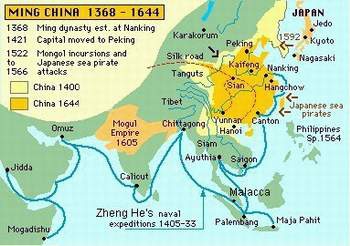 The Ming Emperor, in 1424, decided to abandon the naval expeditions, and thus, the indisputable dominion of all the oceans, the discovery and the conquest of new lands. The Chinese decision of abandoning the naval expeditions left, in a sense, an emptiness of power that was filled by Europe.
The Ming Emperor, in 1424, decided to abandon the naval expeditions, and thus, the indisputable dominion of all the oceans, the discovery and the conquest of new lands. The Chinese decision of abandoning the naval expeditions left, in a sense, an emptiness of power that was filled by Europe.
To our understanding, this is the motive for which – according to the very same “reading of history” - China believes it was destined to create a universal empire and that that vocation was snatched away from it by the “barbaric” peoples of the tiny European peninsula.
Brzezinski:
The intense current nationalism of the Chinese people is new only as far as its social penetration, seeing as how in it intervene self-identification and the emotions of an unprecedented number of Chinese. Chinese nationalism is done being a phenomenon primarily confined to students that, in the early years of this century, were the precursors of the Kuomintang and of the Chinese Nationalist Party. Chinese nationalism is, currently, a phenomenon of the masses that defines the mentality of the most populated State in the world. That mentality has deep historical roots. History has predisposed the Chinese elite to think that China is the natural center of the world. In fact, the word “China” in Chinese – Zhong-guo, or “middle kingdom”- transmits the idea of the centrality of China in world matters and, at the same time, it reaffirms the importance of national unity. (Brzezinski, 1998: 163)
As a consequence, if China is able to neutralize the terrible exogenous forces –that desire its internal fragmentation- maintain its social stability and its accelerated rate of development during the next three decades, it will then reach the conditions that Helio Jaguaribe denominates “equipollence” with the United States. The success of Chinese development –plus the possible partial recuperation of Russian power, that would begin with Vladimir Putin, and to the adoption of a foreign policy and a policy of self-defense on behalf of the hard nucleus (Germany and France) of the European Union- could cause a “multi-polar world order” to prevail mi-century, a circumstance that would increase the international margin of labor and national autonomy of South American countries.
The Challenges that Come from the Far East
And now, independently from the fact that China could become a high technology and knowledge producing power – a condition sine qua non for it to reach a relationship of “equipollence” with American power- there are few doubts as to whether or not it is a real possibility that around 2030 the Asian country would be in a position to become a great industrial power, with real capacities for providing, with their manufactured products, for the entire world.
Once China transforms into the “world’s big factory”, it will also become – as already happens, in a certain way, presently -, a “giant vacuum of raw materials”, consequently provoking a substantial elevation of their international prices. This fact, that already favors the primary South American economies, will tend to become more and more obvious. A new golden wave will then come about for the exportation of primary products, an era into which, maybe, we have already entered.
The adding into the realm of universal commerce of a new and voracious demander of raw materials (to which we must add the growing demand of India) – whose presence can already clearly be “palpated” at present, through the simple statistical survey of the amazing increases in value of commodities in recent years- it will generate a new pressure, added to those already in existence, that could paradoxically influence in a highly negative way in the possibilities of autonomous development of the South American region.
It is that, encouraged by the growing values of their extractive products, the temptation to go back to pre-industrial diagrams – especially in Argentina and, though in less measure, also in Brazil - could become more and more intense. Furthermore, it would encourage – and even worse, “it would justify” - the position of those local elite that consider plans for autonomous industrial development “unnecessary” and even “forced”. This goes without mentioning those South American countries whose economies continue depending on pre-industrial plans, in which, directly, the future would make it unpractical to make any attempt to industrialize or technologize autonomously. To the mental pressure for, and consequent temptation of, deindustrializing we must add, as a compliment or natural corollary, the disproportionate global “offer” of manufactured goods – from low, midrange and high technology- that with the irruption of a “salesmen” China (and probably also of India) they will end up lowering the prices of these manufactured goods to probably despicable levels.
The existence of a new “buyer” of raw materials has, as a logical counterpart, the apparition of a new ”seller” of manufactured goods, and the competition and overabundance of the latter will end up exponentially multiplying international pressure to maintain the totality of South America as a “natural market” and, thus, obtain “unrestricted openness” of the economies of South American nations. Such an overabundance of manufacture good in the global market – of which the scale of production that China can reach will be in large part be responsible- will tend to make the price of any manufactured industrial product made far away from our region infinitely inferior to the cost of any manufactured industrial product in South America.

We will have to add the destructive effect of possible surpluses of global industrial production to the disproportionate supply. Given the enormous scale of production that China’s economy is capable of reaching –and India’s as well- between 2020 and 2050, it is highly probable that these economies generate enormous surpluses of production to such point that, indiscriminately dumped into the international market, they would be sold at despicable prices, even under that of their costs, for it will be more valuable to these new economies to poorly sell their produced goods before halting their growth. The commercial dispute with other already industrialized nations for specific markets will be capable of making South America one of the main “ducks at the wedding” of this global dispute for consumption markets.
This situation would clearly be capable of annihilating local production and, due to not being neatly and completely foreseen and neutralized by an intelligently protective policy, consented to, common and univocal, it would condemn all of South America to an excluding specialization and it would return the nations of the region to the condition of mere providers of raw material and non-manufactured agricultural products.
Footnotes:
1. The numbers on the population, surface area, industrial production and effectives of the armies used here are taken from the brilliant work of Aldo Ferrer (2001b: 19-28).
2. From the beginning of the First World War, the American ruling elite came up with the idea that the United States should support English power to eliminate to only real competitor that was German industrial power, to become in that way the main hegemonic power in the world. One of the men of the elite who most clearly expressed the North American hegemonic project from the time of the war with Spain was Theodor Roosevelt. But the American ruling elite knew that the execution of that geopolitical plan would not be bearable to the people, imbued with deep democratic ideals. Thus, Woodrow Wilson will translate, into a more easily assimilated way –by wrapping it in an idealistic format- for the American people, the hegemonic geopolitical project that had been expressed brutally by Roosevelt. As the American historian Immanuel Wallerstein states (quoted by MetholFerre, 2001: 30), the fundamental fact of the first half of the 20th century is the Anglo-Saxon alliance, that destroys German industrial power, which was the heart of Europe. That act settled the question of the century that later became the competition of two State continents, the Soviet Union on one hand and the United States on the other. And that new competition just barely went to sleep in 1989.
3. All of China’s story has predisposed its ruling elite to think that their nation is the natural center of the world: “That perspective also implies the existence of a hierarchic system of radially ordered influence that goes from the center to the periphery, and thus China, as the center, expects to be treated with difference by others. […] From that lens, the loss of China’s grandiose –the last one-hundred and fifty years of humiliation is an aberration, a profanation of the special Chinese condition and a personal insult to each Chinese- should be erased and its perpetrators deserve to be punished” (Brzezinski, 1998: 163-164).
Bibliography
ANDREWS, C.M., The Colonial Background of the American Revolution, ed. Univ. de Yale, New Haven, 1924.
ANDREOTTI, Gonzalo Cruz, “Introducción general” a POLIVIO, Historia. Libros I-V, Madrid, Ed. Gredos, 2000.
ARON, Raymond, Paix et guerre entre les nations (avec une presentation inédite de l’auteur), París, Calmann-Lévy, 1984.
BAILEY, Paul, China en el siglo XX, Barcelona, Ed. Ariel, 2002.
BEER, G.L., The Old Colonial System, 1660-1754, ed. Macmillan, Nueva York, 1912.
BENEYTO, Juan, Fortuna de Venecia. Historia de una fama política. Madrid, Ed Revista de Occidente, 1947.
BEY, Essad, Mahoma: Historia de los árabes, Buenos Aires, Ed. Arábigo-Argentina El Nilo, 1946.
BENZ, Wolfgang, Amerikanische Besatzungsherrschaft in Japan 1945-1947. Dokumentation. Vierteljahrshefte fur Zeitgeschichte, 26 .Jhg, 2H, abril 1978.
BIEDA, Karl. The Structure an Operation of the Jananese Economy. Sydney, ed John Wiley, 1970.
BRINES, Russel. Mac Arthur’s Japan. New York, ed Lippincott, 1948.
BROSSAR,DE, Maurice, Historia Marítima del mundo, Madrid, ed. Edimat, 2005.
BROCHIER, Hubert. Le miracle économique japonais 1950-1970. Paris, Calman-Levy, 1970
BRZEZINSKI, Zbigniew, El gran tablero mundial. La supremacía estadounidense y sus imperativos geoestratégicos, Barcelona, 1998.
CARMAN, H. J., Social and Economic History of the Uneted States, ed. Heath, Boston 1930.
CLAPHAM, John, The Economic Development of France an Germany, 1815-1914, Londres, Cambridge University Press, 1936.
CLARK, V. S., History of Manufactures in ten United States, 1607-1860, ed. Carnegie Institution, Washington, 1916.
CLAUDER Anna, American Commerce as Affected by the Wars of French Revolution and Napoleon, 1793-1812, ed Univ de Pensilvania, Filadelfia, 1932.
CLAUSEWITZ, Karl von, De la guerra, Buenos Aires, Ed. Labor, 1994.
CLOUGH, Shepard Banroft, France: A History of Nacional Economics, 1789-1939, Nueva York, ed. Charles Scribner’s Sons, 1939.
COLE, G.D.H, Introducción a la historia económica, Buenos Aires, ed. Fondo de Cultura Económica, 1985.
COSANZA, Mario Emilio, The Complete Journal of Towsend Harris, First American Consul General and Minister to Japon, New York, ed Japan Society, 1930
COSTA, Darc, Estrategia nacional, la Cooperación sudamericana como camino para la inserción internacional de la región, Ed. Prometeo, Buenos Aires, 2005
DAWSON, William, Protection in Germany: A History of German Fiscal Policy During the Nineteenth Century, Londres, ed. P. King, 1904.
DAWSON, William, The Evolution of Modern Germany, Nueva York, Ed Charles Scribner’s Sons, 1919.
DERRY T.K y WILLIAMS Trevor, Historia de la tecnología, Madrid, Ed Siglo XXI, 2000.
DROZ, Jacques, La formación de la unidad alemana 1789/1871, Barcelona, ed. Vicens-Vives, 1973.
EGERTON, H.E.,Short History of British Colonial Policy, ed. Methue, Londres, 1924.
EAST, R. A, Business Enterprise in the American Revolutionary Era, Ed. de la Univ. de Columbia, Nueva York, 1938.
FAIRBANK, John, China: una nueva historia, Barcelona, ed. Andrés Bello,1996.
FERRER, Aldo, De Cristóbal Colón a Internet: América Latina y la globalización, Bs.As.,Fondo de Cultura Económica, 1999.
FERRER, Aldo, Historia de la globalización. Orígenes del orden económico mundial, Bs. As., Fondo de Cultura Económica, 2001.
FERRER, Aldo, Hechos y ficciones de la globalización. Argentina y el MERCOSUR en el sistema internacional, Bs. As., Fondo de Cultura Económica, 2001.
FRIEDLANDER, H.E y OSER, J, Historia económica de la Europa Moderna, México, ed. Fondo de Cultura Económica, 1957.
FULBROOK, Mary, Historia de Alemania, Cambridge, Ed.Cambrige University Press, 1995.
GADDIS, John Lewis, Estados Unidos y los orígenes de la guerra fría. 1941-1947, Buenos Aires, Grupo Editor Latinoamericano, 1989.
GUILLAIN, Robert. Japon Troisieme Grand. Paris, ed. Seuil, 1969.
HART Michael y NEGRI, Antonio, Imperio, Buenos Aires, ed. Paidos, 2003.
HART, Michael y NEGRI, Antonio, Multitud. Guerra y democracia en la era del Imperio, Buenos Aires, ed. Sudamericana, 2004.
HECKSCHER, Eli, The Continental System, an Economic Interpretation, Oxford, University Press, 1922
HORROCKS, J.W., A Short History of Mercantilism, ed. Metheu, Londres, 1924
HOFFMANN, Stanley, Jano y Minerva. Ensayos sobre la guerra y la paz, Buenos Aires, Grupo Editor Latinoamericano, 1991.
HOBSBAWM, Eric, Industria e Imperio, Buenos Aires, Ed. Ariel, 1998.
HOBSBAWM, Eric, La era de la Revolución 1789-1848.
HOBSBAWN, Eric. La era del capital, 1848-1875. Buenos Aires, ed. Planeta, 1978.
HUGH, Thomas, El Imperio Español. De Colón a Magallanes, Buenos Aires, ed. Planeta, 2004.
IMBER, Colin, El imperio Otomano, Buenos Aires, ed. Vergara, 2004.
JAGUARIBE, Helio, Un estudio crítico de la historia, Buenos Aires, Fondo de Cultura Económica, 2001.
KONETZKE, Richard, El Imperio español, orígenes y fundamentes, Madrid, Ediciones Nueva Epoca, 1946.
HENDERSON, William, The Zollverein, Londres, Cambridge University Press, 1939
HOFFMANN, Stanley, Jano y Minerva. Ensayos sobre la guerra y la paz, Buenos Aires, Grupo Editor Latinoamericano, 1991.
HUGH, Thomas, El Imperio Español. De Colón a Magallanes, Buenos Aires, ed. Planeta, 2004.
LACY, Dan, El significado de la Revolución norteamericana, Buenos Aires, ed. Troquel, 1969.
LEVASSEUR, E, Histoire du commerce de la France de 1789 a nos jours, vol II, París, ed Arthur Rousseau, 1912.
LIANG, Quiao y XIANGSUI, Wang, Guerra senza limite, ed. Librería Editrice Goriziana, Gorizia, 2001
LIST, Friedrich, Sistema Nacional de Economía Política, Madrid, Ed, Aguilar, 1955.
LICHTEHEIM, George, El imperialismo, Madrid, ed. Alianza, 1972.
LUDWIG, Emil, Historia de Alemania, Buenos Aires, ed. Anaconda, 1944.
MAC ARTHUR, Douglas. Reminiscences. London, ed. Heinemann, 1964.
MIGUENS, José Enrique, Democracia práctica. Para una ciudadanía con sentido común, Buenos Aires, Emecé editores, 2004.
MCLUHAN, Marshall, Guerra y paz en la aldea global, Barcelona, ed. Planeta –De Agostini, 1985.
METHOL FERRE, Alberto y METALLI, Alver, La América Latina del siglo XXI, Buenos Aires, Ed. Edhsa, 2006.
MILLER, William, Nueva Historia de los Estados Unidos, Buenos Aires, ed. Nova, 1961.
MONIZ BANDEIRA, Luiz Alberto, Argentina, Brasil y Estados Unidos. De la Triple Alianza al Mercosur, Buenos Aires, Ed. Norma, 2004.
MONIZ BANDEIRA, Luiz Alberto, La formación de los Estados en la cuenca del Plata, Buenos Aires, Grupo Editor Norma, 2006.
MORGENTHAU, Hans, Política entre las naciones. La lucha por el poder y la paz, Buenos Aires, Grupo Editor Latinoamericano, 1986.
MORISHIMA, Michio, ¿Por qué ha triunfado Japón?, Barcelona, ed. Critica, 1997.
MORRISON, Samuel Eliot, Old Bruin. Commodore Matthew C. Perry, 1794-1858, Boston, ed. Little Brown, 1967.
NEUMANN, William, America Encounters Japan. From Perry to MacArthur. London, The Johns Hopkins Press, 1963.
NYE, Joseph, La naturaleza cambiante del poder norteamericano, Buenos Aires, Grupo Editor Latinoamericano, 1991.
OHKAWA, Kazuski and ROSOVSKI, Henry. Japanese Economic Growth. Trend Acceleration in the Twentieth Century. Stanford, Stanford University Press, 1973.
PANICAR, K.M., Asia y la dominación occidental. Un examen de la historia de Asia desde la llegada de Vasco da Gama 1498-1945, Buenos Aires, ed. Eudeba, 1966.
PIERENKEMPER, Toni, La industrialización en el siglo XIX , Madrid, ed. Siglo XXI, 2001.
PINHEIRO GUIMARAES, Samuel, Cinco siglos de periferia. Una contribución al estudio de la política internacional, Buenos Aires, Ed. Prometeo, 2005.
POLIBIO, Historias, libros I-V, Madrid, Ed. Gredos, 2000.
POHLE, Ludwig, Die Entwicklung des deutschen Wirtschafatslebens im letzten Jahrhundert, Leipzig, ed. Teubner, 1923.
POTEMKIN, V. , Historia de la Diplomacia, Buenos Aires, ed. Lautaro, 1943.
PUIG, Juan Carlos, Doctrinas internacionales y autonomía latinoamericana, Caracas, Ed del Instituto de Altos Estudios de América Latina de la Univ. Simón Bolívar, 1980.
REISCHAUDER, E.O. Histoire du Japón et des Japonais de 1945 a 1970. Paris, ed Seuil, 1970.
RIBEIRO, Darcy, El proceso civilizatorio: de la revolución agrícola a la termonuclear, Buenos Aires, Centro editor de América Latina, 1971.
SEDILLOT, René, Histoire des Colonisations, Paris, ed. Fayard, 1958.
SCHULTZ, Helga, Historia económica de Europa, 1500-1800, Madrid, ed Siglo XXI, 2001.
SCHMOLLER, Gustav, The Mercantile System and Its Historical Significance, ed. Smith, Nueva York, 1931.
TAKAHASHI, Kamekichi, The Rise and Development of Japan’s Modern Economy, Tokio, The Jiji Press, 1969.
TOFFLER, Alvin, La revolución de la riqueza, Buenos Aires, ed. Sudamericana, 2006.
TOYNBEE, Arnold, La civilización puesta a prueba”, Buenos Aires, Emecé Editores,1967.
TRIAS, Vivian, El Imperio británico, Cuadernos de Crisis n°24, Buenos Aires, ed. Del noroeste, 1976.
TRYON, R.M.Household Manufactures in the Unites States, 1640-1860, ed. Univ. de Chicago, Chicago, 1917.
UNDERWOOD FAULKNER, Harold, Historia Económica de los Estados Unidos, Buenos Aires, ed. Novoa, 1956.
WARD, Robert. “Democracy and Planned Political Change”. The Japan Foundation Newsletter, vol. IV, n° 6, febrero 1977.
Articles:
DUSSEL, Enrique, “La china (1421-1800). Razones para cuestionar el eurocentrismo”, Otro Sur, Año 1, n°2, Rosario, agosto 2004.
HACKER, Louis, “The First Amecican Revoluction”, Columbia University Quaterly, n° XXVII, 1935.
HAN, Su ngjoo. “Japan’s PXL decisión. The Politics of Weapons Procurement”. Asian Survey, vol XXIII, n° 8, 1978.
HATA Ikuhiko, “Japan under Occupation”.The Japan Interpreter, vol 10, Winter 1976.
HOBSBAWM, Eric “Un imperio que no es como los demás”, Le Monde diplomatique, Bs. As., año IV, n° 48, junio 2003.
NYE, Joseph, “Política de seducción, no de garrote”, Clarín, Buenos Aires, 11 de septiembre 2006.
ZAITSEV, V. “Japan’s Economic Policies: Illusions and Realities”.Far Eastern Affaier, n°1, 1978.
SATO, Seiichiro. “The Trouble with MITI”, Japan Echo, vol. V, n°3, 1978.
00:05 Publié dans Actualité, Eurasisme, Géopolitique | Lien permanent | Commentaires (0) | Tags : actualité, géopolitique, politique internationale, chine, inde, asie, affaires asiatiques, eurasisme, eurasie |  |
|  del.icio.us |
del.icio.us |  |
|  Digg |
Digg | ![]() Facebook
Facebook
Ralph Peters: the concept of constant conflict

Ralph Peters: the concept of constant conflict
Retired Lieutenant Colonel of United States Army Ralph Peters, over the course of his military career, was in the Office of the Deputy Chief of Staff Intelligence and was responsible for the development of methods of future wars. Before becoming head of the department of Eurasia, he worked exclusively on finding solutions to problems of tactics. Graduating from the College of Command and General Staff of the US Armed Forces, the military expert has a master’s degree in international relations. During his service, Peters visited both professionally and personally more than 50 countries, including Russia, Ukraine, Georgia, Ossetia, Abkhazia, Armenia, Azerbaijan, Uzbekistan, Kazakhstan, Latvia, Lithuania, Estonia, Croatia, Serbia, Bulgaria, Poland, Hungary, the Czech Republic, Pakistan, Burma, Laos, Thailand, Mexico, and the Andean highlands. During the Cold War, he worked as an officer of US military intelligence for 10 years in Germany, after specializing in the Soviet Union. In retirement, he was released in 1998. Peters is known not only as an expert in the field of national and global security, intelligence, military strategy, and tactics, but also as a writer of fiction on military subjects, and as a rule he writes dystopia novels, reflecting, albeit in a different form, as well as in research papers on his visions for the near future.
 The most interesting thing about the point of view of the military expert is that it directly intersects with Alexandr Dugin’s comprehension of contemporary American hegemony as “Chaord” (Chaos+order) hegemony. Moreover, recent developments in the Arab world are directly related to these concepts, and Peters is exactly in line with his ideas about US policy in the region and the world at large. The article "Constant conflict", which most clearly reflecting Peters’ approach to analysis of modern geopolitics, came in 1997 in the "Options" military magazine.
The most interesting thing about the point of view of the military expert is that it directly intersects with Alexandr Dugin’s comprehension of contemporary American hegemony as “Chaord” (Chaos+order) hegemony. Moreover, recent developments in the Arab world are directly related to these concepts, and Peters is exactly in line with his ideas about US policy in the region and the world at large. The article "Constant conflict", which most clearly reflecting Peters’ approach to analysis of modern geopolitics, came in 1997 in the "Options" military magazine.
Peters describes the situation after the end of the Cold War as growing instability. The world is becoming involved in more and more conflict; no end of history is expected. Moreover, along with the processes of globalization and the process of development, a global tribalization emerges. In the article "Return of the tribes", published in the Weekly Standard magazine, he shows that while globalization creates a new global aristocracy, billions of people who have no place in this system cannot find themselves but through a new trend, which is the antithesis of globalization - tribalization which is manifested in ethnic and religious aspects. There is also the multi-million class of "soldiers": terrorists, guerrillas, members of voluntary, and clandestine groups, mercenaries operating outside the organized armies of national systems that challenge as nation-states US domination of the world. The world is becoming more dangerous and unstable.
The result of the globalization process will be the polarization of the world, strengthening its division into a winning minority and a losing majority. The last category includes not only all the countries of the "poor South", but a significant part of the population of the "rich North", where the differences in income and welfare between the rich and poor will only increase. In the article "Culture of a future conflict," Peters explains that future wars and conflicts will be determined by the inability of national governments to become effective system of distribution and control of resources. Whole cultures will play a role as competition. As a result, the class war is of such a magnitude that Marx could not imagine, and it will be combined with intercultural conflicts. They will be an integral feature of this century, defining the style and direction of conflict in the 21st century, just as the confrontation of ideologies did in the 20th.
Further computerization of society has not only positive but also negative effects. For the first time, an idea can spread faster than the most dangerous and deadly epidemics; by contaminating the mind they give rise to a new type of epidemic.
In the context of an ever-increasing flow of information, the accessibility and speed of communication processes of some societies, such as Russia, Serbia, Black Africa, and the Middle East, did not demonstrate sufficient flexibility in its assimilation and the ability to share a variety of quality information, and they will inevitably lose. And since, as Peters noted in the "Constant conflict", a country’s place in the global hierarchy of today is determined by how culture works with information, or more precisely as it adapts to the Post-Modern situation and information society, "the main task is to manage the information”. Societies that are in fear and therefore cannot control the free flow of information will not be competitive. They may own western technology for watching videos, but the West write the scripts, produce them, and collect royalties.
That is, the current globalization processes, contrary to liberal mythology, promotes dominance of some cultures and chaos and degradation of other cultures. Peters frankly calls democracy "a cleverly-liberal form of imperialism."
The resistance to the United States will become increasingly fierce.
"Those humans, in every country and region, who cannot understand the new world, or who cannot profit from its uncertainties, or who cannot reconcile themselves to its dynamics, will become the violent enemies of their inadequate governments, of their more fortunate neighbors, and ultimately of the United States. We are entering a new American century, in which we will become still wealthier, culturally more lethal, and increasingly powerful. We will excite hatred without precedent."
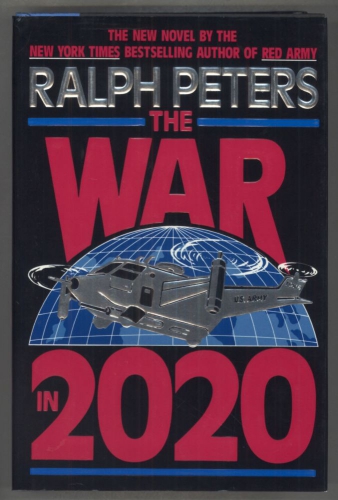 According to the American strategist, one of the defining conflicts of the future will be a conflict between information masters and its victims. US’ main weapon here is American mass culture, brands, followed by, should it be necessary, military intervention.
According to the American strategist, one of the defining conflicts of the future will be a conflict between information masters and its victims. US’ main weapon here is American mass culture, brands, followed by, should it be necessary, military intervention.
“Contemporary American culture is the most powerful in history, and the most destructive of competitor cultures. While some other cultures, such as those of East Asia, appear strong enough to survive the onslaught by adaptive behaviors, most are not. The genius, the secret weapon, of American culture is the essence that the elites despise: ours is the first genuine people's culture. It stresses comfort and convenience--ease--and it generates pleasure for the masses. We are Karl Marx's dream, and his nightmare.”
Shows, series, movies, most despised by intellectual elite - showing extreme brutality and the most frank sex - is America’s most popular cultural weapon, and whether it is bought or pirated, it is replicated everywhere. Thus, cultural horizons of humanity are established and American hegemony and its ideology thrive.
In Peter’s world of constant conflict and informational domination of the US, the main thing is not to maintain order, but the violent suppression of the competitor; a place of long-term and global strategy takes local and tactical calculation. From the point of view of Peters, we will not have to deal with conventional wars, such as realpolitik, but the conflicts posed by collective emotions, local interests, and systemic collapses.
“There will be no peace. At any given moment for the rest of our lifetimes, there will be multiple conflicts in mutating forms around the globe. Violent conflict will dominate the headlines, but cultural and economic struggles will be steadier and ultimately more decisive. The de facto role of the US Armed Forces will be to keep the world safe for our economy and open to our cultural assault. To those ends, we will do a fair amount of killing.”
In his 2008 work “Never Quit the Fight”, Ralph Peters notes that new wars will lead the United States into a war of attrition, where “wars of attrition” are a continuous war until the total destruction of the enemy. In order to win the general postmodern war, he believes it is necessary to abandon the maxim "if you break something, it belongs to you," abandon the responsibility for what happens in areas where war is being waged.
However, in the general chaos, Peters insists that America should not only be limited to local actions to maintain its superiority. America has a mission, and this mission of democratization should not be sidelined, even if a certain authoritarian regime demonstrates dedication and loyalty to the United States. The US must carry democracy, but connecting all the global information networks is not a particularly democratic way of thinking about the implications for other countries.
Another idea is redrawing the boundaries of the world's borders. Peters is the author of the famous phrase "Greater Middle East", which is published in his article "Blood borders: How a better Middle East would look" in the ‘US Armed Forces Journal’, with comments from Ralph Peters.

Of all the world leaders who are a main enemy of the United States, according to Ralph Peters, a long time has been spent specializing on Russia and Putin. In the article "Why Putin should scare us", he calls him the most effective national leader belonging to the traditions of Russian aggressive nationalism. Putin restored the imperial power of Russia, and therefore should be eliminated.
Summing up the theoretical provisions of Peters about the future state of the world of conflict, his position on democratization, the need to eliminate imperially orientated leaders who are for the redrawing of boundaries, the violation of national sovereignty, the sovereignty of (a word he often uses as a quote) - it all sounds pretty ominous. In principle, one could perceive them as mere mental theoretical constructs, generated by an extravagant US military thinker and writer, but the analysis of what Obama and previous Bush administrations did shows a similar picture of the world. Peters’ expressive texts are key to the decisions of the current American leadership tediously written in diplomatic language. Ralph Peters rightly predicted the postmodernist-chaos oriented model of behavior. It’s very strange that today he criticizes Obama for the realization of his own ideas.
00:05 Publié dans Actualité, Géopolitique | Lien permanent | Commentaires (0) | Tags : chaos, nouvel ordre mondial, ralph peters, stratégie, géostratégie, géopolitique, politique internationale, chaordre, géopolitique du chaos, états-unis |  |
|  del.icio.us |
del.icio.us |  |
|  Digg |
Digg | ![]() Facebook
Facebook
Renaud Camus : « Il faut créer et préserver des sites de l'exigence »

Renaud Camus: «Il faut créer et préserver des sites de l'exigence»
Renaud Camus ─ Extrait tiré d'un entretien de la revue Réfléchir & Agir (n°52 - Hiver 2016)
Ex: http://frontdelacontre-subversion.hautetfort.com
R&A : Au-delà du raz-de-marée des clandestins, l'effondrement de notre civilisation n'est-il pas total et perceptible autant dans la destruction très avancée de la langue française que dans le triomphe des écrans ?
R. C. : Je suis tout à fait d'accord avec vous quant à l'état de délabrement avancé de la langue française, qui touche toutes les classes sociales mais aussi toutes les classes culturelles. Jadis parlaient mal les gens qui parlaient mal, aujourd'hui c'est à peu près tout le monde, à commencer par ceux, professeurs, intellectuels, que leur profession ou leur vocation devraient inciter à apporter un soin particulier à leur langage. La clavier de la langue ne cesse de perdre des touches. Ce n'est pas seulement le vocabulaire, qui se réduit, c'est la syntaxe qui se contracte en même temps qu'elle se délabre. A peine a-t-on eu le temps de faire son deuil du subjonctif imparfait ou du passé simple, c'est le futur qui bat de l'aile (« Tu viens la semaine prochaine et on prend un verre ? »), l'impératif (« Corinne, tu sors de l'eau ! ») et même maintenant le subjonctif présent, si du moins l'on s'en remet à Karim Benzema dans ses démêlés récents avec Valbuena (« Alors j'lui dis : " Faut qu'tu vas voir le mec " »). Or la réduction du clavier de la langue n'a pas seulement des conséquences sur la communication, elle en a aussi sur l'intellection et même la perception. L'homme ne peut rien appréhender de ce que son vocabulaire ne sait pas nommer ; il ne peut rien concevoir de ce que sa syntaxe ne sait pas ordonner. L'effondrement syntaxique est une des composantes essentielles de l'hébétude qui gagne, et cette hébétude est elle-même la condition sine qua non du Grand Remplacement. Qu'il s'agisse d'éducation, de culture, de territoire ou de beauté du monde, je fonde de grandes espérances sur les sanctuaires, comme au Haut Moyen-Âge. Il faut créer et préserver des sites de l'exigence, de l'étude, de la rigueur, de la splendeur : des lieux de conservation et de rayonnement, et bien sûr de reconquête. »
00:05 Publié dans Actualité, Entretiens | Lien permanent | Commentaires (0) | Tags : actualité, renaud camus, entretien |  |
|  del.icio.us |
del.icio.us |  |
|  Digg |
Digg | ![]() Facebook
Facebook


